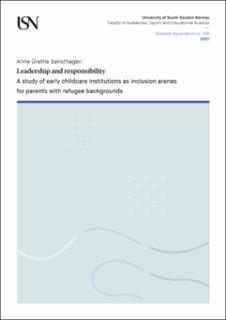| dc.description.abstract | In this article-based dissertation, I have investigated how Norwegian early
childcare institutions function as inclusion arenas for parents with refugee
backgrounds and the leadership's responsibility in this matter. Previous research
has illustrated a lack of, among other things, multicultural competence in
Norwegian educational institutions and a lack of research on leadership and
parent cooperation in culturally diverse early childcare settings. Thus, more
knowledge on the interaction between management, staff, and parents, their
recognition of parents with refugee backgrounds, the leadership's support of staff
in cooperation with parents, and the leadership of multicultural professional
development, are imperative. The study addressed in this dissertation provides
new knowledge in these areas.
I use critical theory to discuss symbolic power issues and constructivism to
discuss leadership and learning organizations. Symbolic power is understood as an
overarching term for recognition, multiculturalism, and inclusion. It is a concealed
form of power that neither the dominant group nor the dominated groups reflect
upon or resist. The dominant group defines the understanding of reality, and there
is a common consensus connected to this understanding, contributing to
reproduce the social order. Leadership is understood as an influence of change or
action, aiming to achieve a shared purpose in the institution. A learning
organization is, among other things, defined as a well-managed institution that
emphasizes hybrid leadership. The learning line leaders facilitate individual and
collective learning and reduce structural and personal obstacles that might hinder
learning. The staff is continually learning how to learn together.
The study, which consists of a pre-study and a main study, is qualitative, with
elements of a case study design. The pre-study includes mothers and pedagogical
leaders from four institutions, whereas the main study includes parents, staff,
pedagogical leaders, and managers from two institutions that participated in the
national in-service program, Competence for Diversity. I have used several data collection methods: individual interviews and focus group interviews, participant
and non-participant observations, researcher-directed process diaries, and field
notes. The aim of the study is investigated through four research questions
discussed in four articles.
The first article, "Jeg savner barnet mitt." Møter mellom somaliske mødre og
barnehagen [“I miss my child.” Encounters between Somali mothers and early
childcare institutions] investigated how trust was established and developed
between mothers with Somali backgrounds and pedagogical leaders and how the
mothers experienced their cooperation with the management and staff. The
analyzed results exemplified that the mothers appeared to be in a constant
negotiation process where they tried to adapt themselves and their children to
the institution's culture. The management and staff seemed to, unconsciously,
reproduce the majority's cultural capital. Still, the mothers described the
relationship with the management and staff as a trusting relationship.
The second article, Early childcare as arenas of inclusion: the contribution of staff
to recognising parents with refugee backgrounds as significant stakeholders,
investigated how the institutions functioned as inclusion arenas through the
management and staff’s recognition of the parents. The analyzed results
illustrated that the parents seemed to need sufficient Norwegian language skills
and understanding of the institution's social codes to be recognized as significant
stakeholders. Moreover, cultural diversity did not appear implemented in the
institution's pedagogical practice, even though the parents' backgrounds seemed
recognized in everyday life. I question whether the majority's discourse and
capital dominated the institutions and whether the institutions functioned more
as integration arenas than inclusion arenas.
In the third article, 'Learning by talking?' – The role of local line leadership in
organisational learning, we discuss the leadership role in professional knowledge
development of multicultural competence. Through the analyses, one of the
institutions that participated in Competence for Diversity appeared to have
implemented more measures that promoted more productive work with the professional development work than the other. We developed the concept of
hybrid leadership further to a hybrid named the learning line leader. The leader
balances staff and tasks, systems and individuals, and daily operations and
development.
The fourth and last article, Interkulturell kompetanseutvikling – ein studie om
leiing av barnehagepersonalet som lærer å lære om foreldresamarbeid
[Intercultural competence development – a study on the leadership of early
childcare staff who learn to learn about parent cooperation], investigated the
leadership and support of staff to ensure equitable collaboration with parents
with refugee backgrounds through the professional development of intercultural
competence. A tool to analyze this professional development leadership was
developed and used to analyze and discuss the results. A structured organization
of the professional development work and distribution of responsibility appeared
to affect the collective learning processes. Moreover, a systemic leadership of
organizational learning seemed to be necessary to ensure collective knowledge
building. Even though inclusive practices were evident in both institutions, both
appeared to lack a common objective when working with all parents' inclusion.
We question whether some of the expressed practices and perspectives
contribute to reproducing inequalities and marginalize parents with refugee
backgrounds.
The analyzed results of this study contribute to both a national and international
discussion on leadership in early childhood education and care and add an
essential element to this discussion, namely the significance of studying the
institution's work with multiculturalism, inclusion, and recognition of parents, and
how the management can work to detect and challenge potentially symbolic
power. | en_US |

